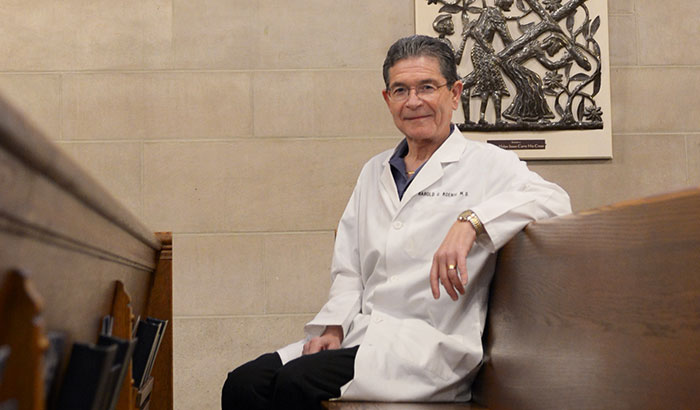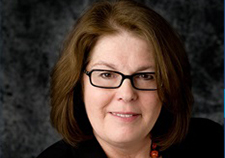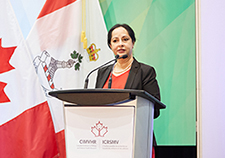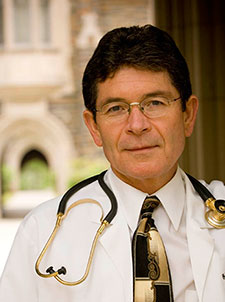Office of Research & Development |
 |


Dr. Harold Koenig has become one of the top proponents in the research community for using religion as a therapy for Veterans with PTSD. (Photo by Linnie Skidmore)
April 4, 2018
By Mike Richman
VA Research Communications
Dr. Harold Koenig grew up in a home with devout Catholic parents, but he wasn’t raised religious. Nor is he pious today. He’s a non-denominational Protestant who attends church mainly because of his deeply religious wife.
“I probably would go fishing most of the time,” he says. “I find a lot of connection with God in nature and hunting and fishing.”
Yet, in sort of a paradox, Koenig has become one of the top proponents in the research community for using religion as a therapy for Veterans with PTSD. The head of the Center for Spirituality, Theology, and Health at Duke University in Durham, North Carolina, he’s aligning this approach with Veterans who are experiencing moral injury, which is essentially a conflict with one’s personal code of morality. For instance, a Veteran may feel guilt, shame, or self-condemnation for violating his or her moral beliefs in combat by killing someone, witnessing death, or failing to prevent the immoral acts of others.
The concept of moral injury is gaining recognition in VA. It’s not a mental health condition like PTSD, but the symptoms—depression, anxiety, withdrawal, relationship problems, and an increased risk of suicide to name a few—are similar. Plus, many studies have shown that moral injury and PTSD are related.
“If you have less moral injury, you often have less severe PTSD,” Koenig says.
To Koenig, the idea of moral injury seems to coalesce with his academic interests in religion.
“Part of that has to do,” he says, “with the whole notion of moral injury: people feeling guilty or ashamed or having trouble forgiving or having conflicts about their religious beliefs, feeling punished by God, deserted by God. All of these things seem to just really mesh together.”
He adds: “The whole concept of morality basically comes from religious beliefs and values. Certainly in this country, which has a very religious populace, our Veterans, our military personnel, our soldiers come from a religious culture that has an enormous influence on them regardless of what they are taught during training. In the military, you’re trained for the mission. You’ve got to accomplish the mission. That’s what you’re after.”
Koenig is on a mission of his own.
"If somebody is involved in a religious community, the likelihood of suicide goes down dramatically...."
The 66-year-old psychiatrist has written extensively about mental health, geriatrics, and religion, with hundreds of peer-reviewed publications and dozens of books in print, including the Handbook of Religion and Health. He’s also appeared on many national and international news shows and has testified before Congress on the health benefits of religion and spirituality.
Lately, he’s directed most of his research toward Veterans and active-duty military in the context of moral injury. He served in the Army for two months until a knee injury derailed his stint, and his father and father-in-law both fought in World War II.
He’s led studies related to moral injury, including one in which more than 70 percent of a cohort of nearly 400 Vets said religion was “important or very important” in their lives. That study appeared in the Journal of Nervous and Mental Disorder in February 2018. Religion and spirituality weren’t defined in the study, but Koenig says there’s no difference in the meaning of the two for most Veterans.

Dr. Jay Gorman
Suicide prevention care

VA Researcher Named One of U.S.’ Top Female Scientists

Million Veteran Program director speaks at international forum
Koenig has also created a scale that includes religious elements to assess the severity of moral injury in Veterans (see sidebar). He led a study on the scale that appeared in the Journal of Religion and Health in February 2018. In that study, nearly 90 percent of more than 400 Veterans and active-duty military gave a rating of 9 or 10 in severity for at least one moral injury symptom on a scale from 1 to 10, with 10 being the worst. Fifty percent gave the same rating for more than five symptoms.
Now, Koenig is zeroing in a spiritual form of psychotherapy for treating moral injury in Veterans and active-duty military with PTSD. No proven treatments exist for PTSD and moral injury that use a patient’s spiritual resources, despite evidence that religious beliefs predict faster recovery from PTSD.
He’s co-authoring the first randomized clinical trial to test that model (see sidebar).
Dr. Donna Ames, a psychiatrist at the VA Greater Los Angeles Healthcare System, is leading the trial. Given the epidemic of suicide in the Veteran community, in which about 20 people per day are taking their own lives, she welcomes Koenig’s passion for using religion as a therapy for moral injury.
“We know that a lack of religion, or a sense of something greater than oneself, is a risk factor for suicide,” she says. “Dr. Koenig and others have published data suggesting the risk of suicide is five times greater in people with no religious practice than those who have a religious practice. In studies of happiness—positive psychology—people who are religious tend to be happier than those who are not religious. There’s good evidence that religion can bolster a person through hard times and prevent depression and suicide.”
She notes that VA’s whole health approach addresses, in part, a Veteran’s religious and spiritual life in the recovery process from illness. The initiative is part of a shift by VA facilities from a health care system focused on treating disease to one based on healing relationships and partnerships.
Koenig says he’s counseled patients who are on the verge of suicide and are “barely holding on through their devotion to religion.” Currently, he devotes most of his time to research at Duke University and the Durham VA Health Care System, where he works as a non-paid employee. He sees patients a few hours a week in the geriatric clinic at Duke’s hospital. Some of them, he says, are elderly former service members with “lots of complex problems.” Others are younger non-Veterans with chronic pain.
“I’m not seeing that many patients, but literally what keeps some of them alive day-by-day is their religious faith,” he says. “There’s no question about that. If somebody is involved in a religious community, the likelihood of suicide goes down dramatically because they have that sense of support, that sense of meaning, which is crucial for keeping people from attempting or committing suicide.”
In addition to his stateside affiliations, Koenig is an adjunct professor at King Abdulaziz University in Saudi Arabia and at Ningxia Medical University in China. He acts as a consultant at both schools, training faculty on how to conduct research in medicine, psychiatry, and oncology, which is the study and treatment of tumors, and in writing academic papers. He travels periodically to those countries to meet with faculty and other academicians.
Some of his work in Saudi Arabia and China, he says, relates to moral injury. Knowing that two indicators of moral injury are religious struggles and a loss of religious faith, he’s looking at the impact of Islam on a range of mental and physical health outcomes. Interestingly, he says, Ningxia Medical University is in an area in northern China that’s about one-third Muslim.
Koenig explains that religions of all types have dealt with moral injury for centuries, noting that many faiths evolved during a time of war and conflict.
“Look at Islam, look at the Prophet Muhammad,” he says. “And certainly the Old Testament and the Torah. It was all during war and conflict. Those religions had in place rituals and practices to deal with moral injury that was in conflict with their beliefs. Those practices and rituals are relevant today. It just seemed to make logical sense to me given that religions that persisted for thousands of years address the issues of guilt and forgiveness. So why not take advantage of that and apply it to our Veteran population? It makes sense to me that we ought to rely on some of wisdom from the ages to address all of these things.”
Koenig’s interest in moral injury is rooted in developments from more than three decades ago.
In his role as a nurse at a hospital in California, he became interested in how patients were handling mental challenges, such as stress. He transitioned with that thought into medicine and earned his medical degree at the University of California, San Francisco, in 1982.
As a family medicine resident at the University of Missouri, he heard from elderly patients how they coped with the emotional strain of illness after being hospitalized due to strokes, heart attacks, or other disabling conditions. Many patients put stock in their religious faith, he says, noting that hearing this from older people was a personal “wake-up call” and ignited his interest in geriatric medicine.
“I thought 'Wow, this is really interesting,’ ” he recalls. “Nobody’s mentioned this anywhere in my training as a nurse or a physician. There was certainly nothing in family medicine. Then I looked in psychiatry and, in fact, it was even worse. Not only did they not talk about it, but everything they had to say about it was negative. So I thought I’m seeing something different. Religion seems to really help these patients. So maybe we ought to first document it and then look at it objectively to see what the connection is with health.
“So that began the next 35 years of my research, which has been one kind of eye-opening finding after another,” he notes.
Koenig first presented the idea to the department of family medicine at the University of Missouri, which he says wasn’t particularly receptive to studying religion as a way to cope with illness but allowed him to do it anyway.
“I got a little upset because when I shared the idea, I got some cold shoulders from people,” Koenig says. “They kind of said, 'Why is he talking about that topic when he ought to be talking about diabetes or hypertension or heart disease?’ I thought religion was relevant to all of those conditions because that’s how people are making it through these illnesses. It probably affects their physical outcomes as well. That got me fired up. I said, 'I’m determined to research this and document it.’ ”
He’s been in dogged pursuit of the truth ever since.

Dr. Harold Koenig heads the Center for Spirituality, Theology, and Health at Duke University. (Photo courtesy of Duke)
In recent years, researchers have examined the impact of moral injury on the health of Veterans with PTSD, including those who fought in the conflicts in Iraq and Afghanistan. But few studies have tried to gauge the effectiveness of religion in treating PTSD-stricken Veterans who are experiencing moral injury.
An ambitious one based on the spiritual model will soon begin at the VA Greater Los Angeles Healthcare System. It will include about 60 Veterans who indicate that religion is important in their lives. They must have significant PTSD symptoms.
“The efficacy of current therapies for moral injury and PTSD is limited,” says Dr. Donna Ames, a psychiatrist at VA Greater Los Angeles who is leading the trial. “Many Veterans may be seeking an alternative approach to their distress from moral injury. An approach that incorporates their religious beliefs may be something Veterans for whom faith is important are seeking.”
One of the trial’s core elements is cognitive processing therapy (CPT), a popular trauma-based psychotherapy that has helped many Veterans with PTSD overcome troubling experiences. It features a 12-session treatment plan that teaches people to evaluate upsetting thoughts that have existed since trauma, with a focus on changing the way they look at themselves and the world. Therapists teach skills that help a person decide whether there are better ways to think about trauma.
The participants will be randomized into three groups that receive either secular CPT; a spiritual form of CPT administered by psychologists and other certified health professionals; or a form of pastoral care administered by chaplains.
Dr. Michelle Pearce, a University of Maryland psychologist who specializes in spirituality and healthcare, led creation of the psychologist-driven spiritual CPT, which differs from standard CPT in several ways. For one, it targets moral injury as a barrier to recovering from PTSD; standard CPT targets PTSD. Also, spiritual CPT integrates a patient’s religious resources, such as beliefs, practices, sacred writings, values, and motivations, into a standard secular psychotherapy.
Dr. Harold Koenig, a professor of psychiatry at Duke University in Durham, North Carolina, assisted Pearce in creating the spiritual therapy. The two are co-investigators in the randomized clinical trial.
In a spinoff of the spiritual CPT model, Koenig and a nationwide group of chaplains created a more religion-specific, chaplain-centered approach that is divided into the teachings of five major religions: Christianity, Judaism, Islam, Hinduism, and Buddhism. The Veterans randomized to the chaplain group can choose the version of pastoral care they want based on their religious faith.
Prior to receiving the therapy, participants will answer a questionnaire that is based on a scale created by Koenig and his colleagues to assess the severity of their moral injury symptoms (see main article). The scale consists of 10 indicators of moral injury: guilt, shame, betrayal, moral concerns, religious struggles, loss or religious faith and hope, loss of meaning and purpose, difficulty forgiving, loss of trust, and self-condemnation.
The scale comes in two forms: a 10-question version that is best suited for clinicians because of its brevity, and a 45-question version that is tailored for researchers because of its depth in assessing the details of moral injury.
The Veterans will complete the 10-item version before each of the 12 sessions to see which symptoms on the scale most need to be addressed by the therapist or chaplain. They’ll fill out the 45-item version at baseline, six weeks, at the end of the clinical trial at 12 weeks, and at the 18-week mark to see if moral injury symptoms are persisting.
“Among those in the spiritual CPT or chaplain-delivered groups, we’ll first identify the religious beliefs that are important to them,” Koenig says. “We’ll then use those beliefs to counteract some of the negative thoughts and fears that are associated with moral injury in the setting of PTSD. We’re targeting moral injury, so we’re going to use the person’s religious beliefs and scriptures to help heal those wounds. We think that by addressing the 10 aspects of moral injury, PTSD conditions are going to perhaps improve or at least be a lot easier to treat.”
He adds: “PTSD is very difficult to treat, especially when it becomes chronic. A lot of Veterans have difficulty complying with drugs and psychotherapy because it’s not ingrained in the belief system that they grew up with, especially religious Veterans. So if we can relieve some of those moral injury symptoms, we think their PTSD may also get better. We’ll see.”
Koenig and his colleagues hypothesize that the spiritual CPT administered by psychologists will outperform the secular CPT and the chaplain approach in reducing moral injury symptoms.
“That’s because you’re using the best of both worlds to attack the problem,” he says. “It involves powerful tools used by mental health professionals, along with a person’s religious and spiritual beliefs, to process the thoughts and behaviors that are destroying someone’s well-being and relationships with others. But we could be surprised. A pastoral care intervention delivered by chaplains hasn’t been tested for treating moral injury or PTSD, so we don’t know how it’s going to affect the participants. Maybe some Veterans don’t always need a psychologist or licensed mental health professional to help with these problems. This is such a fascinating and exciting study because of the many things we may learn from it.”
--- Mike Richman
VA Research Currents archives || Sign up for VA Research updates